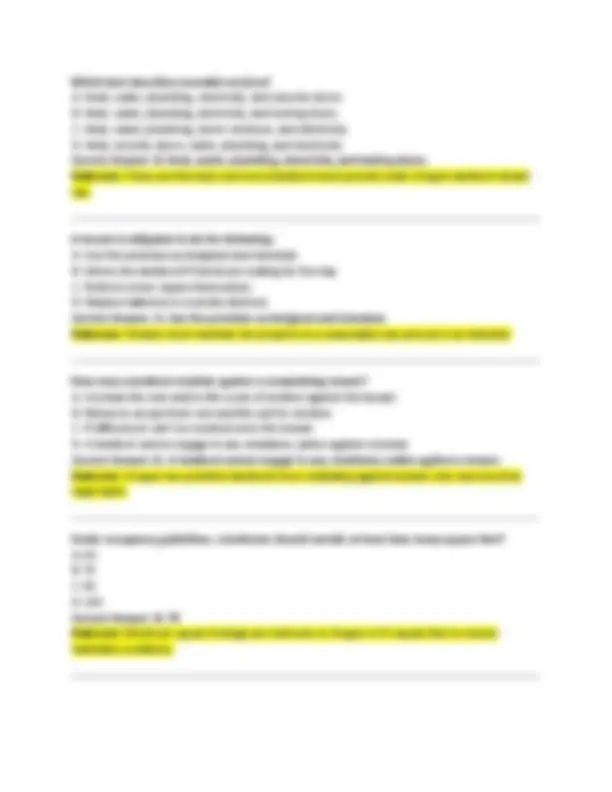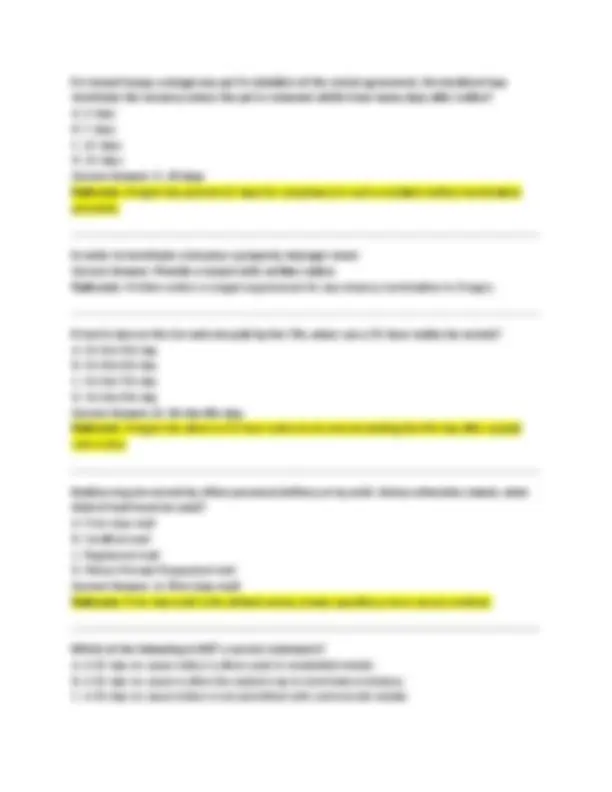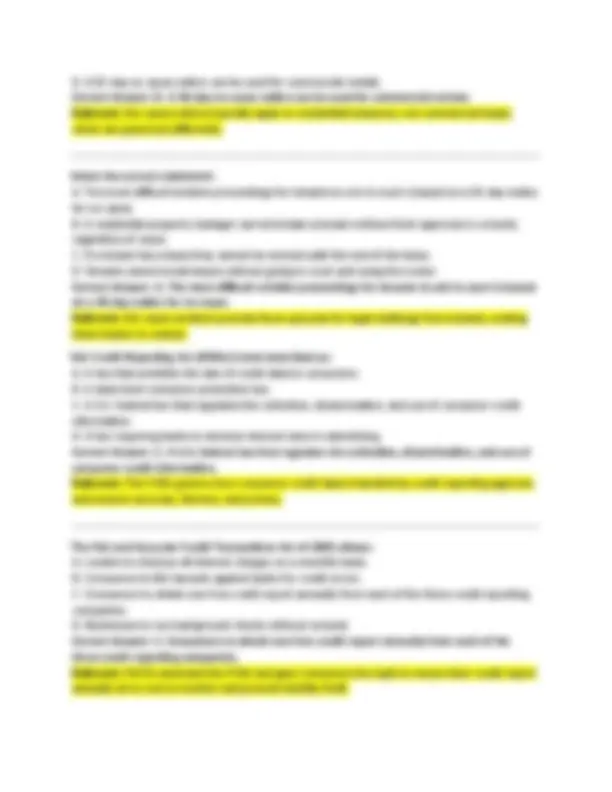



































Study with the several resources on Docsity

Earn points by helping other students or get them with a premium plan


Prepare for your exams
Study with the several resources on Docsity

Earn points to download
Earn points by helping other students or get them with a premium plan
Community
Ask the community for help and clear up your study doubts
Discover the best universities in your country according to Docsity users
Free resources
Download our free guides on studying techniques, anxiety management strategies, and thesis advice from Docsity tutors
Which of the following statements concerning discrimination in Oregon is true? A. The sale of a home may be limited to married couples only. B. A real estate broker may accept a listing with the understanding that the owner will only sell to an unmarried man. C. Real estate licensees are bound by the laws covering discrimination. D. Discrimination on the basis of religion is not covered by Oregon law. Correct Answer: C. Real estate licensees are bound by the laws covering discrimination. Rationale: Oregon law prohibits discrimination in housing, and real estate licensees must comply with all fair housing regulations, including those based on religion, race, and marital status.
Typology: Exams
1 / 41

This page cannot be seen from the preview
Don't miss anything!


































Which of the following statements concerning discrimination in Oregon is true? A. The sale of a home may be limited to married couples only. B. A real estate broker may accept a listing with the understanding that the owner will only sell to an unmarried man. C. Real estate licensees are bound by the laws covering discrimination. D. Discrimination on the basis of religion is not covered by Oregon law. Correct Answer: C. Real estate licensees are bound by the laws covering discrimination. Rationale: Oregon law prohibits discrimination in housing, and real estate licensees must comply with all fair housing regulations, including those based on religion, race, and marital status. Which of the following statements best describes the Fair Credit Reporting Act? A. The Act was created to monitor the inadequate system in establishing a person's credit. B. The Act addressed the serious situation of charging high fees to obtain a credit report. C. The law allows consumers to request and obtain a free credit report once every twelve months from three nationwide consumer reporting companies. D. The Act sponsors ways to stop identity theft. Correct Answer: C. The law allows consumers to request and obtain a free credit report once every twelve months from three nationwide consumer reporting companies. Rationale: This is a key provision under the Fair and Accurate Credit Transactions Act (FACTA), an amendment to the FCRA. When would a landlord NOT have the right to enter a tenant's premises? A. In the case of an emergency. B. A landlord has a tenant's written consent to enter the premise to make a requested repair. C. A landlord has a tenant's written consent to enter the premises to show a prospective tenant. D. A written notice from the tenant not allowing the landlord to enter the premises. Correct Answer: D. A written notice from the tenant not allowing the landlord to enter the
premises. Rationale: Tenants may restrict entry unless for emergencies or where law permits; otherwise, landlord entry without consent is unlawful. Which of the following are considered acceptable payments to a landlord from a tenant? A. Applicant screening charges, security deposits, late charges, and a deposit for more than two children. B. Applicant screening charges, security deposits, late charges, a deposit for a disabled tenant. C. Applicant screening charges, security deposits, late charges, and rent. D. Applicant screening charges, security deposits, late charges, a deposit for a service animal. Correct Answer: C. Applicant screening charges, security deposits, late charges, and rent. Rationale: These are the standard and lawful charges landlords can request; deposits related to children, disabilities, or service animals may violate anti-discrimination laws. A security deposit must be returned to a tenant within how many days? Correct Answer: 31 days after the termination of the tenancy Rationale: Oregon law requires landlords to return security deposits within 31 days to ensure timely reconciliation and fairness. How long does a tenant have to settle or file a lawsuit if they do not receive all or part of the money? Correct Answer: 1 year Rationale: Tenants in Oregon have one year to file claims related to unpaid security deposits after tenancy ends. A late rent payment fee can be charged if: A. Rent is not received by the 10th day of a weekly rental agreement. B. If the rental agreement includes the specifics of a late fee. C. The landlord wants to evict the tenant. D. The tenant fails to comply with new tenant regulations. Correct Answer: B. If the rental agreement includes the specifics of a late fee. Rationale: Oregon law requires that late fees be detailed in the rental agreement to be enforceable.
If a tenant keeps a dangerous pet in violation of the rental agreement, the landlord may terminate the tenancy unless the pet is removed within how many days after notice? A. 2 days B. 7 days C. 10 days D. 14 days Correct Answer: C. 10 days Rationale: Oregon law permits 10 days for compliance in such a violation before termination proceeds. In order to terminate a tenancy a property manager must: Correct Answer: Provide a tenant with written notice Rationale: Written notice is a legal requirement for any tenancy termination in Oregon. If rent is due on the 1st and not paid by the 7th, when can a 72-hour notice be served? A. On the 5th day. B. On the 6th day. C. On the 7th day. D. On the 8th day. Correct Answer: D. On the 8th day. Rationale: Oregon law allows a 72-hour notice to be served starting the 8th day after unpaid rent is due. Notices may be served by either personal delivery or by mail. Unless otherwise stated, what kind of mail must be used? A. First class mail B. Certified mail C. Registered mail D. Return Receipt Requested mail Correct Answer: A. First class mail Rationale: First class mail is the default unless a lease specifies a more secure method. Which of the following is NOT a correct statement? A. A 30-day no cause notice is often used in residential rentals. B. A 30-day no cause is often the easiest way to terminate a tenancy. C. A 30-day no cause notice is not permitted with commercial rentals.
D. A 30-day no cause notice can be used for commercial rentals. Correct Answer: D. A 30-day no cause notice can be used for commercial rentals. Rationale: No-cause notices typically apply to residential tenancies, not commercial leases which are governed differently. Select the correct statement: A. The most difficult eviction proceedings for tenants to win in court is based on a 30-day notice for no cause. B. A residential property manager can terminate a tenant without their approval or consent, regardless of cause. C. If a tenant has a lease they cannot be evicted until the end of the lease. D. Tenants cannot break leases without going to court and suing the owner. Correct Answer: A. The most difficult eviction proceedings for tenants to win in court is based on a 30-day notice for no cause. Rationale: No-cause evictions provide fewer grounds for legal challenge from tenants, making them harder to contest. Fair Credit Reporting Act (FCRA) is best described as: A. A law that prohibits the sale of credit data to consumers. B. A state-level consumer protection law. C. A U.S. federal law that regulates the collection, dissemination, and use of consumer credit information. D. A law requiring banks to disclose interest rates in advertising. Correct Answer: C. A U.S. federal law that regulates the collection, dissemination, and use of consumer credit information. Rationale: The FCRA governs how consumer credit data is handled by credit reporting agencies and ensures accuracy, fairness, and privacy. The Fair and Accurate Credit Transactions Act of 2003 allows: A. Lenders to disclose all interest charges on a monthly basis. B. Consumers to file lawsuits against banks for credit errors. C. Consumers to obtain one free credit report annually from each of the three credit reporting companies. D. Businesses to run background checks without consent. Correct Answer: C. Consumers to obtain one free credit report annually from each of the three credit reporting companies. Rationale: FACTA amended the FCRA and gave consumers the right to review their credit report annually at no cost to monitor and prevent identity theft.
Current market value - Ans - the amount in cash, as determined by the county assessor, that could reasonably be expected to be paid for a manufactured dwelling or floating home by an informed buyer to an informed seller, each acting without compulsion in an arm's-length transaction occurring on the assessment date for the tax year or on the date of a subsequent reappraisal by the county assessor Dispose of the personal property - Ans - if reasonably appropriate, the landlord may throw away the property or may give it without consideration to a nonprofit organization or to a person unrelated to the landlord. The landlord may not retain the property for personal use or benefit Tenant's belongings are considered abandoned if - Ans - the rental agreement ends, the tenant has been gone from the rental unit continuously for at least 7 days after a court has ordered an eviction of the tenant, when a sheriff's department executes a court order of eviction Select the correct statement.
How many days after the Agency completes a compliance review does the property manager have to cure the noncompliance without sanction? - Ans - 30 days from the date the compliance review is completed If the Agency has reasonable grounds to believe that the funds of an owner or tenant may be missing, funds may have been misappropriated, or that the property manager's records are in such a condition that the property manager is placing owners' and/or tenants' money at risk the Agency may - Ans - immediately initiate an investigation without providing a property manager with an opportunity to cure noncompliance If all noncompliance issues are not cured within 30 days the Agency may - Ans - impose sanctions on the property manager or may initiate an investigation and not allow additional time for the property manager to cure the noncompliance When serving as the property owner's representative, the property manager must - Ans - keep tenants content by maintaining the condition of the property Financial responsibilities of a property manager - Ans - Maximize the property owner's long- term return on the investment in the property by optimizing rent level and reducing operating costs, prepare annual budgets, and a budget projecting monthly-allowed expenses What type of knowledge must a property manager have? - Ans - Market knowledge and be aware of market conditions and rents Reasonable care and diligence - Ans - They must have and maintain the care and skill possessed by a competent, similarly situated property manager, and must provide the property owner with all facts that might influence the property owner's decisions regarding the property A property manager is liable to the property owner for - Ans - any loss caused by their lack of care, and cannot escape responsibility by pleading ignorance or claiming that they were following accepted management practices
A property manager serves as the owner's _____ to the tenants and must ____ the owner's long term return - Ans - representative; maximize What is the responsibility of a property manager? - Ans - Obtain the best possible return on the owner's investment, preserve the owner's investment, provide financial records and accounts The basic goal of the professional property manager is to? - Ans - get the highest possible long- term, net return Honesty and Good faith - Ans - They must disclose all material facts about the property to both the property owner and the tenants on the property Loyalty - Ans - A property manager cannot act in a way that is adverse to the interests of the property owner in the property Confidentiality - Ans - A property manager must maintain the confidentiality of the property owner's personal and proprietary information unless under court order or otherwise required by law. A property manager must maintain confidentiality even after the agency relationship has terminated. Accounting - Ans - A property manager must keep a record of all funds received and disbursed on behalf of the property owner, and must make a timely accounting of those funds. Further, the property manager must hold these funds in a Client's Trust Account until date of payment is due. Where must a property manager hold all funds received and disbursed on behalf of the property manager? - Ans - Client's Trust Account Disclosure - Ans - a property manager must disclose to the property owner, in a timely fashion and in writing, when they have a financial interest in a business that performs work on the property being managed. They must also provide monthly and annual reports to the client as to the condition of the property
how much and how the property manager will be compensated for services (usually a flat percentage of the total rents collected) including any rent abatements or their discounts. It must ave an expiration date and provide for the agreement's termination, and bare a code that matches the ledger card kept with the property management file If the property manager is also a principal broker, and sells the property, the parties - Ans - must enter into a listing agreement apart from the property management agreement Property management agreements must be ________________ and specify the property to be managed. - Ans - Written To abide by Oregon Administrative Rules a properly drafted property management agreement should include which of the following?
Tenancy at sufferance - Ans - Comes into existence when a tenant holds over after the expiration of a lease without the landlord's consent because the tenant failed to surrender possession after termination of the lease. Intended to prevent the acquisition of title by adverse possession. Cannot be transferred. Residential Lease Agreement - Ans - constitutes a transfer of an interest in real property. Contains the names of the tenant and the landlord, a description of the property being rented, the duration of the lease, the amount of rent and when it is due, including a security deposit, and several other clauses If a lease is for a period of time one year or greater - Ans - the lease is subject to the statute of frauds and must be written and signed by the owner (lessor) If a rented property is being managed by someone other than the landlord, the lease agreement must contain - Ans - the name of the property manager and his or her contact information A landlord or property manager may access rented premises without prior notice - Ans - in the event of an emergenct A residential lease agreement will describe which utilities - Ans - will be paid for, if any, by the landlord Tenancy from year to year is created with a termination date. True/False - Ans - False Under Oregon law, in a month-to-month tenancy, the landlord has a right to
Full service lease (gross lease) - Ans - the landlord pays capital expenses and pays for most utilities. common where a tenant leases a small space in a large building Ground lease - Ans - bare land only Lease option - Ans - option which allows a lessee to purchase the property they are leasing. typically structured as rights of first refusal A residential lease may restrict tenant behavior. True/False - Ans - True A tenant who pays rent and all of the ownership costs involved with the property usually has what type of lease?